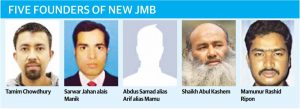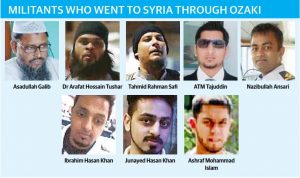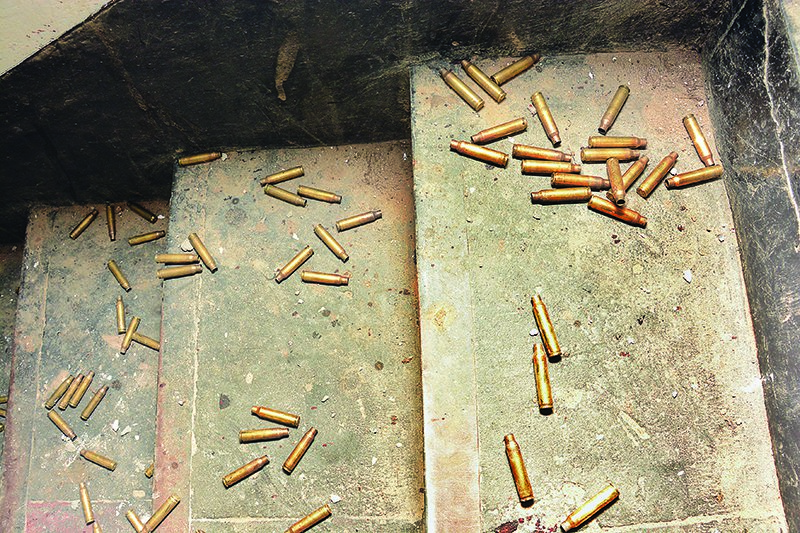
Dhaka Counter-terrorism and Transnational Crime (CTTC) Unit chief Monirul Islam in various conversations with this correspondent reiterated that IS has no organisational presence in Bangladesh.
“The terrorists who have been arrested do not talk about IS presence. But New JMB follows IS ideology. Another organisation named Ansar Al Islam follows al-Qaeda. But none of these groups are affiliated with the international terrorist organisations. However, we have learned of their efforts to gain affiliate status,” he said. New JMB’s top leaders have been in touch with people in Syria from the beginning to run their operations in Bangladesh, said one law enforcement official who wished to remain anonymous. From several raids in militant dens, they have found evidence pointing to this connection. In their documents, New JMB members refer to the IS members as ‘brothers in Sham (Syria).’ What sort of communication does New JMB have with IS-affiliated people? And who are they? Evidence shows IS was contacted about many terrorist attacks, starting from the murder of Italian citizen Ceasare Tavella in Dhaka’s Gulshan in September 2015, to several other attacks around the country, including the July 2016 Holey Artisan Bakery attack in Gulshan. Unidentified people in Syria were asked for permission before the attacks. Some investigating officials think the money coming in to fund New JMB is from Syria. They are receiving the money through Hundi. New JMB members are also contributing their assets to the fund. Officials involved in counter-terrorism say at least 50 young Bangladeshi men have gone to Iraq and Syria to fight for IS since 2014. The ringleader of this operation is Sujit Debnath alias Saifullah Ozaki, a man who converted to Islam from Hinduism and settled in Japan, obtaining citizenship there. At least two terrorism suspects have mentioned him in their court confessions. His activities began through a Facebook closed group called ‘Ex-cadet Islamic Learning Forum’, which motivated young men to go to Syria. Two members of this group were arrested in May 2015 from Dhaka. They told law enforcement that Ozaki was the admin of this group. Among the men who went through him to Syria were Asadullah Galib, Dr Arafat Hossain Tushar, Tahmid Rahman Safi, ATM Tajuddin, Nazibullah Ansari, Ibrahim Hasan Khan, Junayed Hasan Khan, Ashraf Mohammad Islam and ATM Tajuddin.

Inscription on the wall of a militant hideout in Sitakunda, which was raided by the law enforcement agencies on March 16 this year, indicates the inhabitants there swore allegiance to the Iraq-Syria based terrorist organisation Islamic State Dhaka Tribune
These men are believed to be running the New JMB operations from Syria. CTTC chief Monirul however, told this correspondent: “We have some information about Saifullah Ozaki that he helped those who wanted to go to Syria. But we do not have any information of him being related to the Gulshan attack or other terrorist activities in Bangladesh.” No connection has been found between the people who tried to go to Syria in 2014-15 and the New JMB members, he said. “We arrested a man named Gazi Kamrus Sohan, who said in interrogation that he is not affiliated with any group. He went to Syria to fight for Muslims, but came back because his views did not match the ideology of the so-called Mujahideen there,” he added. “Most of the Bangladeshi men who went to Syria went there to fight the Assad government of their own volition, they are not associated with any group,” he said. Another law enforcement official said the virtual communication between local terrorists and people in Syria do not mention any specific names. One ID is contacted through a messaging app, and that ID sends back instructions and directions. One police official said that investigation had confirmed that the so-called Abu Ibrahim Al Hanif had never left the country. “He was inside the country. One message we retrieved was signed: ‘Message from Shaikh Abu Ibrahim Al Hanif to the brothers in Sham,’ and that makes us believe this person is someone who lived in Bangladesh,” the official said. This official is convinced that Sarwar Jahan, who was killed in a Rapid Action Battalion raid in Ashulia, was Hanif.
Is it justifiable to say that New JMB only follows IS ideology, when evidence suggests to constant communication between the two? Asked, security analyst Brig Gen (retd) Abdur Rashid said: “In this day and age, it is very easy to exchange information across the world. Many of those who have gone to Syria-Iraq from Bangladesh, even though they are very small in number compared to the rest of the world, could be connected to people in Bangladesh.” “But we cannot see an organisational link here. We cannot say IS is present here based on personal connections. In fact we are yet to see an open declaration of Bay’ah or affiliation.”

